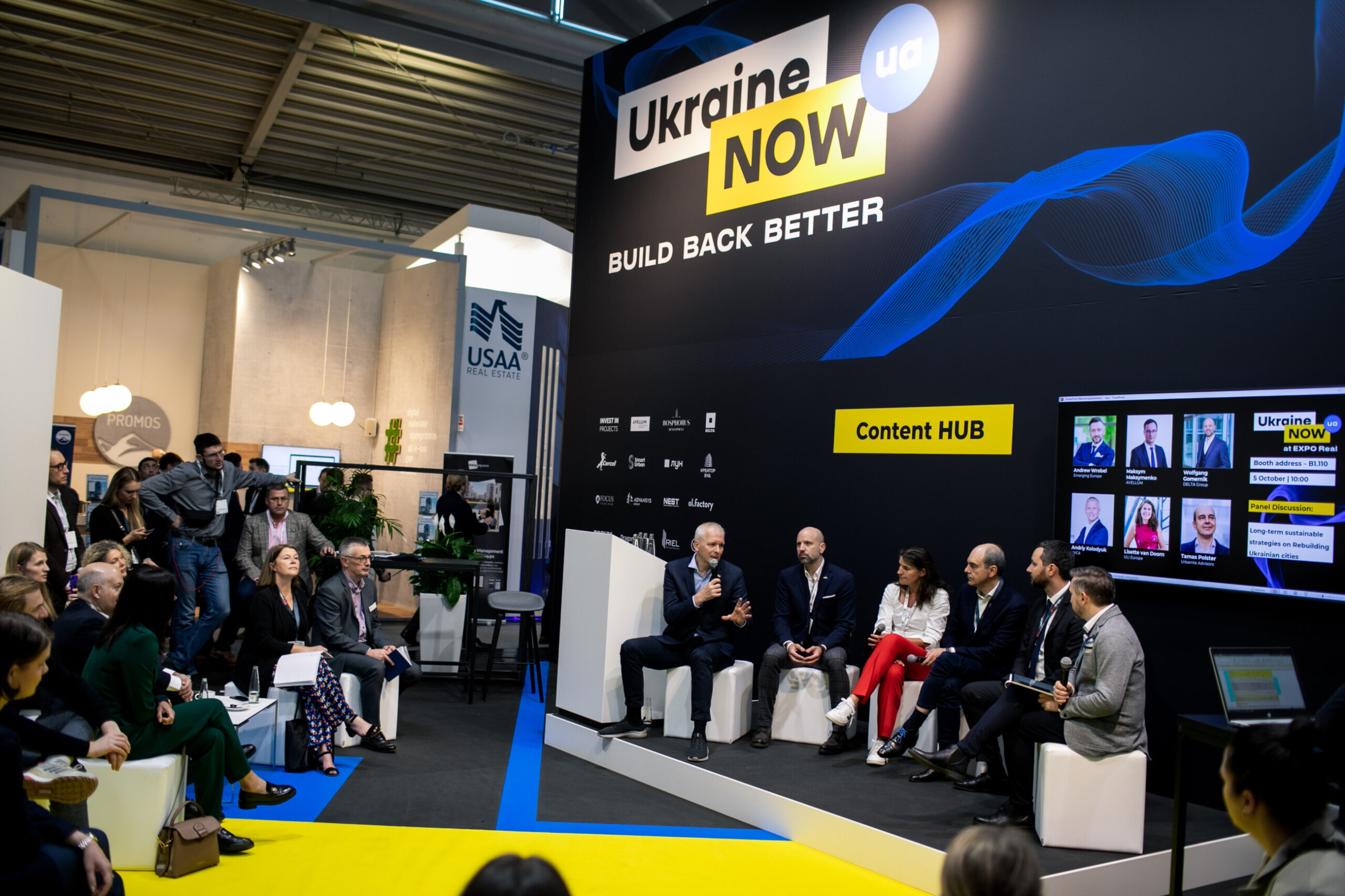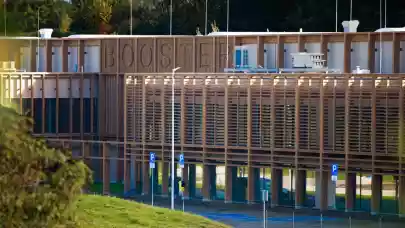
With over 20 million sqm of residential and commercial space destroyed across Ukraine during the past seven months of Russia’s full-scale invasion, the country will need to be rebuilt on a large scale. It creates attractive opportunities for property developers and investors but also requires the proper planning and legal framework to ensure that the new urban environment across Ukraine is liveable, financially viable, and safe to invest in. The consequences of the Russia-inflicted war in Ukraine for the real estate sector was one of the central topics discussed at Expo Real on 4-6 October 2022 in Munich.
This year Ukraine was honoured to be presented for the first time at EXPO Real with the visible pavilion dedicated to ‘Rebuild Ukraine.’ The organizing partner of the stand was Invest in Projects, a global promoter of the Ukrainian real estate industry.
The program of the Rebuild Ukraine Forum was designed to inform the international business community about the current situation in the real estate market in Ukraine and its potential beyond the war pictures.
“For us, it is important that multi-disciplinary experts with local and international backgrounds have an opportunity to clash their opinions, visions, and practical solutions during open dialogues at the stand. Such discussions are the right way to find the best plan for building back a better Ukraine”, adds Anna Nestulia, Principal at Invest in Projects, coordinator of the Rebuild Ukraine Booth at EXPO Real.

Anna Nestulia
Principal
Invest in Projects
At the same time, all speakers and guests at the stand expressed confidence that Ukraine will shortly become a safe and increasingly attractive destination for massive real estate investments. They used the opportunity to learn more about the country and meet its active real market players.
ESG aspects will need to be treated rationally with respect to their importance
The expert session on the second day of the Rebuild Ukraine Forum aimed to brainstorm a future of the post-war country, including sustainable strategies and the European path of Ukraine. Recognized experts in different fields of the real estate industry looked at the topic from different angles, as defined by their practical expertise.
Lisette Van Doorn, Chief Executive at ULI Europe, believes that in current circumstances, Ukraine’s strategy and priority to build temporary housing, modular, and prefab is evident and understandable. But at the same time, she underlined that the industry cannot waste this opportunity to think long-term. “I hear a lot about the digitalization of Ukraine. The biggest hurdle of the building process is that getting permits in other countries is an extremely long process. So, in case this process can be digitized, providing for improved transparency, Ukraine can get lots of gains and also speed up a longer-term process letting people return to their life”.
Continuing on priorities, Wolfgang Gomernik, CEO of DELTA Group and DELTA Ukraine, sees a solution in developing entrepreneurship hubs in Ukraine, providing different needs for new developments. “Definitely, we cannot ignore the fact that international money will require standards according to the European Green Deal and similar. But at the same time, in view of the scale of current damage in Ukraine, sustainability and ESG aspects will need to be treated rationally with respect to their importance and the need to develop space in a quick and cost-efficient manner. The priority is to deliver housing, adjust logistics chains and reconstruct critical infrastructure in Ukraine. At the same time, fostering digitization efforts are essential to reduce bureaucracy and make rebuilding faster”.

Wolfgang Gomernik
CEO
DELTA Group & DELTA Ukraine
Maksym Maksymenko, Partner and the Head of Real Estate and Infrastructure at AVELLUM mentions that the government keeps working on simplifying and improving Ukrainian laws, prioritizing investment projects, and supporting businesses operating in the country. “The Parliament passed several bills to simplify land allotment and housing construction for IDPs, infrastructure, and other real estate projects. In August, the Parliament also passed an important bill that significantly improved the legal framework for residential real estate construction and provided much-needed guarantees for investors. Much work is also being put into PPP legal framework improvement, which is planned to be used for large-scale residential real estate reconstruction. In the meantime, foreign partners and IFIs negotiate financing and guarantee the residential real estate construction projects with the Government. Our partners have confidence in us and are willing to support Ukraine even before the war is ended”.
Admitting how efficient Ukrainian authorities are in digitalization, particularly construction permits, Tamás Polster, Partner and Co-Founder at Urbanite Advisors points out also hidden pitfalls to take into account. “If you can build anywhere, anything is good now, but it is a risk in the mid and longer-term if there is no more urban control of what is needed and where. So we need to have the right balance in this approach”.
In terms of housing, he specifies that the most sustainable approach is when you do not build new residential units but renovate or restore old or damaged branches. “We should focus on rebuilding and renovating existing stock connected to the cities, other than start building fast units where in six months people will realize they have nothing to do there and need to return to cities,” Tamas adds.

Tamás Polster
Partner and Co-Founder
Urbanite Advisors
The post-war pressure for fast and cost-effective rebuilding will be vital. Therefore the risks of repeating bad practices are high. Experts believe the balance between quick rebuilding approaches and longer-term vision using best urban planning practices, including the principles of the 15-minute city mixed-use developments for living, working, and leisure, are fundamental parts of the sustainable rebuilding of Ukrainian cities.

What's the experience of companies operating in Ukraine?
The third day of EXPO Real brought together local and international companies with ongoing projects in Ukraine. The speakers discussed the challenges of wartime, the business opportunities that exist, and possible bottlenecks in all real estate sectors.
The Ukrainian real estate market is not only about reconstruction or rebuilding, as it was well undersupplied with quality stock across all its sectors pre-war, and the past eight months further deteriorated the situation in many sectors.
Marta Kostiuk, former Head of Research and Development Consultancy at Cushman & Wakefield in Ukraine and now based in the company’s office in Prague commented on the current situation on the commercial real estate markets in Ukraine: “We estimated that during the period from 24 February 2022, in the most developed Greater Kyiv area around 440,000 sqm of warehousing and logistics space were destroyed or damaged, which accounts for over 1/5 of the total quality stock on the local market. At the end of Q2 2022, primary vacancy reached only around 3%, and 4.1% including sub-lease opportunities of 20,000 sqm. To put it into context, at the end of 2021 before the full-scale invasion, primary vacancy in the sector was estimated at around 1% as all new properties were occupied before their commissioning, and many occupiers increasingly considered pre-leases and BTS options due to very low space availability. Despite the current uncertainty, and in line with the global trends, the investment potential of the warehousing and logistics property market across Ukraine remains particularly high and will start to be realized once the security situation improves.”
In the office property sector in Kyiv, during the past several months, cumulative gross leasable stock decreased by 50,000 sqm as several business centres in the city were damaged. According to Cushman & Wakefield, total office stock in Kyiv, with a 3 million official population, now totals only 2.2 million sqm compared to 6.2 million sqm in Warsaw, 4.1 million sqm in Budapest, and 3.3 million sqm in Bucharest. The primary office vacancy exceeded 20% (compared to around 11% at the end of 2021), with additional space availability formed by sub-lease options. The prime office rent for offices with basic fit-out dropped from US$20-27 per sqm per month at the end of 2021 to US$10-18. Despite the ongoing military threats, occupier demand remains notable in Kyiv, mainly driven by relocations of IT companies from eastern and southern regions of Ukraine, as well as the increased presence of international NGOs and governmental organizations in the country. Quality flexible / coworking space, as well as offices with full fit-out, are particularly demanded.
Supporting such statements, Tamas Polster, Partner and Co-Founder at Urbanite Advisors, added that in Ukraine, the office stock per capita is ca. 2 sqm, while in Western European cities it is 15 sqm, and the number of white-collar workers is the same in Ukraine percentage-wise to the population as it is in Germany. So the shortage of stock is evident, especially in flexible office space, as not all the talent will be working remotely anyway.
Roman Yemets, General Director of the real estate investment company Smart Urban Solutions, shared the company’s plans and commitment to continuing operations in Ukraine. With several major commercial projects in the pipeline and several shopping centres destroyed by shelling, the team is now putting all the effort into being ready with the projects to start their construction. “Despite all the challenging conditions, we use the current period as extra time to do something. As part of the ongoing process, the company is now working with the famous UK architectural bureau on the master plan and concept of the mixed-use project in central Kyiv next to the main national stadium. The project implementation will take 5-6 years, but we are currently investing money into constructing a food hall in its underground part. Notably, the majority of occupiers of a future food hall confirmed technical conditions for premises discussed pre-war, thus confirming their intention to open in the project.

Roman Yemets
General Director
Smart Urban Solutions
In the next 3-5 years, the company plans to make significant investments into the real estate business, not expecting government financial support that will be mainly directed towards infrastructure and other projects with no commercial viability but high importance for a sustainable country’s reconstruction. Roman also added that most Ukrainians, who are IDPs or moved abroad, are waiting for when they will be able to return home safely. It is a strong statement for real estate investors and developers about Ukraine’s development potential. In addition, in Ukraine, many know-how practices are fairly innovative for Europe, including retail digital innovations and quick delivery systems that Ukrainian companies have already implemented.
Representing the transportation and logistics business Anna Lugovskaya, Corcel Group supported the views about Ukraine’s high potential. She also emphasized that apart from offices in Poland and Spain, the company actively operates in Ukraine with clients in many cities, including Kyiv and Kharkiv.
Colin Ross, Managing Director of Gleeds Ukraine, shared his views on the current situation in the real estate business in Ukraine: “There is a misconception among a lot of people that Ukraine stopped when the war started, and that is just not true. With several projects on hold, we as an organization see many office fit-out projects and development projects in logistics, manufacturing, and repairs (unfortunately) of the shopping centres destroyed. The most important is that business does not stop, as we have to continue with what the country and its people need, which is everything: manufacturing, places to work, and places to live; and such an approach works both ways. The major international organizations are looking at Ukraine and its real estate market at this present time to invest in Ukraine substantially. It is a very positive indication that the workforce in Ukraine is ready, willing, and able to fulfil what the western world needs and to cover the existing shortfalls”.
The residential market in current circumstances is one of the tightest sectors across Ukraine. The housing stock is often not what the population needs; now, residential construction is one of the most active sectors in Ukraine, with several exciting and innovative projects being implemented.
According to LUN, the Ukrainian PopTech company specialised in residential real estate, in February 2022, 1,300 residential complexes were under construction across Ukraine, with the sales of apartments commenced in 1,770 projects. As of September 2022, after six months of the full-scale invasion, construction works recommenced on 800 residential complexes (or 62% of those under construction in February 2022), while 1,350 projects relaunched their sales.
Illya Velychko, CCO at NEST, a Ukrainian development company with a diversified portfolio of projects in many sectors, expressed his views that the residential property sector, along with the prime offices in Kyiv’s CBD, is the most attractive real estate sector for investments because of its generally stable nature and high-income yielding potential. Among the ongoing projects of NEST is the residential complex with 7,000 apartments on a 40-ha site, which will be affordable but permanent housing delivered in accordance with high-quality standards.
Talking about technologies and innovations in residential construction, Lars Karb, Director of Reconstruction at OneUkraine briefly presented their long-term initiative of fast delivery of residential space with the building system based on 3D container modules, which get assembled on-site. He explained that the program is highly scalable and ensures the delivery of high-quality permanent housing at high speed and low cost because it allows the manufacturing of the input parts by multiple partners. “End-to-end, including the permitting process, we can build permanent housing with 30 apartment units fully fitted out and ready to move-in in 6 months. We are now evaluating several land plots for suitability to have the first building standing by the end of spring 2023 and then building a thousand apartments in 2 years.”
Lars added that, as the Ukrainian market is unique in the way that around 90% of people live in the apartments they own. The major issues the company faces now are who will own the flats, and how to structure further management of the delivered housing. But he is convinced that the operational model will have to shift towards the rental market to accommodate so many people that need housing now, with a positive effect on labour mobility in the country.
During wartime, there are many opportunities to donate and support humanitarian and other needs of the country and its population. The key however is the need for private investment to rebuild Ukraine. The three days of panel discussions and individual meetings demonstrated that there are and will increasingly be commercially attractive and viable business opportunities in the real estate market across Ukraine, with no need to be only charitable. In Ukraine, there are now improved and investor-friendly procedures and legal frameworks in place. This, along with the skilled professionals and hard-working intelligent workforce, will be able to facilitate efficient investments and implementation of quality development projects. It is the right time to plan and invest in Ukraine’s sustainable future.



